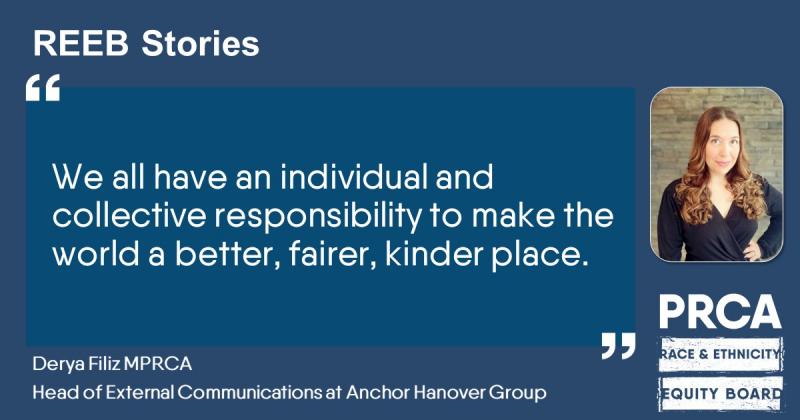
Since July last year, the PRCA Race and Ethnicity and Equity Board has been working hard to tackle the ethnicity pay gap in PR and communications and demanding a psychologically safe, racist-free environment that is fair and equitable across all ethnicities. REEB has also recently launched its new mentoring programme - PRISM - designed to empower professionals from all ethnicities to succeed in public relations and communications.
The conversations being had on the Board and with the wider industry are not easy. But as REEB’s Chair Barbara Phillips so aptly wrote, “it's easier than having to hold your tongue, absorb microaggressions, and in some cases, crush your dreams in an effort to hold onto your job and enjoy some fleeting semblance of a career for years on end.”
The 11 REEB members bring their own unique experience and expertise to the table. As REEB’s work continues, we’re putting its members in the spotlight to find out what drives them, their PR journey and the Board’s priories moving forward.
As a member of the PRCA Race and Ethnicity Equity Board, what are you most looking forward to getting started on in the role?
Working with this incredible and insightful collective group that is REEB. Collaborating with the PRCA and its members to achieve racial equality and equity and making the PR and communications industry fairer and more inclusive.
What do you see as the main challenges to REEB's aims and how will the board tackle them?
Inequality, racism, unconscious bias are all deeply complex and emotive issues, so tackling them is not going to be easy. But I’m optimistic that we are entering an era where is it no longer ‘ok’ for people to bury thier heads in the sand and ignore these issues.
Organisations and businesses are being held accountable by their colleagues, customers, and consumers, so need to add far more substance to their diversity and inclusion commitments. As comms people we have a fundamental role to be at the forefront of this necessary culture change and to help our clients and our own organisations navigate these changes.
REEB has a pivotal role to play and can provide information, support, and collaborate with people and organisations, to help tackle these issues and help them on their journey – at whatever stage - to bring about positive, meaningful and sustainable change.
How did you originally get started in public relations/communications?
I started out as a journalist writing travel, news and features for The Times, London Evening Standard and various newspapers doing editing jobs. To make extra money I began writing for PR agencies and found I really enjoyed the range and breadth of working in a comms role, so it felt like a natural next step moving into PR. Working as a journalist gave me an incredible insight into how the media machine works. Learnings I’ve taken with me and applied throughout my career.
What are some of the projects you have been a part of during your career that you're most proud of?
Working for Anchor Hanover, England’s largest not-for-profit provider of housing and care for people in later life, we wanted to champion the rights of older people, another under-represented group facing discrimination. So we launched Standing Up 4 Sitting Down, a campaign to increase the provision of free seating in public areas which is a key factor deterring older people from getting out, increasing loneliness and isolation.
The campaign was a huge success and really resonated with the public, prompting a national conversation about the need to value older people. It drove a measurable increase in brand awareness and persuaded retailers, politicians and media to stand up for sitting down. We went on to win PRCA and CIPR awards and I won Communications Professional of the Year at the Women in Housing Awards following the campaign, so it was great to get the recognition from our peers also.
What do you love most about working in the PR and communications industry, and would you still recommend this as a career?
I just love it. Everything from the challenge of interpreting business objectives into a comms strategy to sharing heart-warming stories to landing coverage to driving real, tangible behavioural change. Its powerful stuff and I would still definitely recommend PR and Comms as a career … but you do need to develop a thick skin!
Can you share some of your experiences in the PR and comms industry that highlight some of what REEB talks of in the TOR?
In over 15 years in this industry, working as a woman of Turkish and Turkish Cypriot heritage, I have only ever met one other person with the same ethnic heritage as me. That’s crazy!
Being a minority within a minority can feel pretty lonely, but through organisations like the PRCA, I’ve found that you can make valuable connections with like-minded people and find support in a wider community and through REEB, be an active advocate for diversity, equality, and inclusion in the Comms industry.
If there was no REEB what would you being doing in this space?
Seeking out ways to help young people who don’t have the usual access or networks to break into the industry. I think we all have an individual and collective responsibility to make the world a better, fairer, kinder place.
What is the most important thing the Board should focus on right now
The Ethnicity Pay Gap report was a key milestone for REEB and it includes really useful guidance on how to address barriers to equality, so definitely one for agencies and organisations refer to and use.
Another focus for REEB is creating meaningful support groups to encourage people to develop their skills, improve performance and maximise their potential to become the comms professionals they want to be. Mentoring is a great way to enable people to do this, so watch this space for more on REEBs upcoming new initiative …
